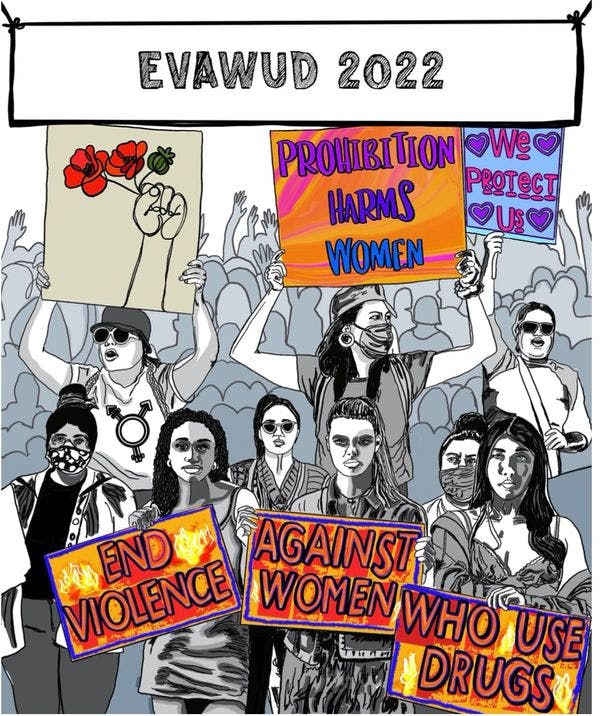End violence against women who use drugs: 2022 EVAWUD campaign
With the International campaign for the elimination of violence against women 2022, the Eurasian Women’s Network on AIDS (EWNA) and the Women and Harm Reduction International Network (WHRIN) call for an end to all forms of violence against women who use drugs.
Women who use drugs, including trans and gender non-conforming people, are subject to extreme levels and a wide range of physical and psychological harm due to punitive prohibition of some substances in the EECA region and globally.State driven stigma, criminalisation and corruption drive substantive health and safety harms and act as barriers between women who use drugs and critical harm reduction and gender-based violence (GBV) services. Women who use drugs experience GBV at up to2-5 times the rate experienced by other women in the general public. This violence includes, (but is not limited to) forced and coerced sterilisation and abortion, rape, sexual harassment, loss of child custody, imprisonment for mere personal possession or use, and other types of gendered violations, stigma and discrimination.
Women who use drugs around the world can face arbitrary detention, extortion, police violence, torture and ill-treatment, with over a third of women in prison incarcerated for drug offences globally. Due to the war on drugs, women survivors have little recourse and often no support, particularly in cases of violence from intimate partner, police, prison guards and medical staff. The experiences of violence against women who use drugs are even more extreme for those facing intersecting discrimination, such as HIV-positive women, women of colour, sex workers, LBT women or women with disability. These conditions have only worsened during COVID-19 restrictions which have created contexts that have escalated GBV without matching responses for women at risk or being exposed to violence.
EWNA and WHRIN note that by collaborating with groups of women who use drugs, supporting and documenting peer led actions and services, the appropriate responses to these inequities and violations are clear. Meaningful involvement of women who use drugs must feature as the cornerstone to all good practice responses in developing GBV services for women who use drugs.
As the criminalization of drug use and HIV stands as the primary barrier between women who use drugs and attainment of human rights including access to harm reduction, HIV prevention, treatment and care and other essential health services, decriminalisation is also imperative.Expansion of harm reduction and inclusion of violence mitigation and support services are also critical. Sexual and reproductive health is now promoted as an essential service that should be incorporated within the harm reduction suite of services for people who use drugs, and that best practice service delivery integrates comprehensive GBV services.
EWNA and WHRIN call for an end to the war on drugs to end violence against women.Legislation and legal principles, procedures, policies, programmes and practices relating to criminal justice must be reviewed to determine if they are adequate to prevent and eliminate violence against women who use drugs or if they have a negative impact on women and, if they do, to modify them in order to ensure that women who use drugs enjoy fair and equal treatment.
Please join us in ensuring adequate resources and legislative frameworks to uphold the safety and human rights of women who use drugs.
